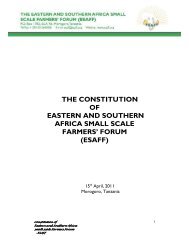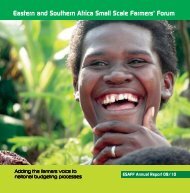“Food First Fair Trade Farmers’ Solidarity”
ESAFF Brochure with contacts 2010 - the Eastern & Southern Africa ...
ESAFF Brochure with contacts 2010 - the Eastern & Southern Africa ...
- No tags were found...
You also want an ePaper? Increase the reach of your titles
YUMPU automatically turns print PDFs into web optimized ePapers that Google loves.
Current Countries Making ESAFF and contacts<br />
Burundi - ESAFF Burundi<br />
Q Industriel, Avenue de 1’ Agriculture;<br />
Tel: +257 22 257647<br />
E.mail: esaffburundi@esaff.org or esaffburundi@yahoo.fr<br />
Kenya - Kenya Small Scale <strong>Farmers’</strong> Forum (KESSFF),<br />
P.O Box 1134, Thika, Kenya.<br />
Tel: +254-67 31686,<br />
Fax +260-1-67 – 30055<br />
Email: esaffkenya@esaff.org ; or kessffokenya@yahoo.com<br />
Cell: +254-724281610<br />
Lesotho - Small Scale Farmers of Lesotho,<br />
P.O. Box 503 Mafeteng, Lesotho<br />
E.mail: esaff-lesotho@esaff.org Cell: +266-63294581<br />
Madagascar - Confédération des Agriculteurs Malagas-<br />
CPM)<br />
Lot IV M 7 Ambodivona, BP 1291<br />
101 Antananarivo - Madagascar<br />
Tél. 261 20 22 658 67<br />
Fax: 261 20 24 780 28<br />
Email: fekritama@moov.mg - Website: www.fekritama.mg<br />
Seychelles - Seychelles Farmers Association (SeyFA)<br />
1 st floor, Secti Building, Roche Caiman Mahe, Seychelles<br />
E-mail: seyfa@seychelles.net<br />
Tel. +248-344533<br />
RSA - Small Scale Farmers Network of South Africa,<br />
P.O Box 1834, Marble Hall (Limpopo), South Africa.<br />
E.mail: esaffRSA@esaff.org Cell +27780395589<br />
National Network of Small Scale <strong>Farmers’</strong> Group in<br />
Tanzania (MVIWATA)<br />
P.O Box 3220, Morogoro, Tanzania.<br />
Telefax +255-23-2614184<br />
E-mail: mviwata@africaonline.co.tz Cell: +255-715976585<br />
Uganda - ESAFF -Uganda<br />
P.O Box 3791, Plot 155 Kira Road Kamwoka, Kampala<br />
E.Mail: esaffuganda@esaff.org Cell: +256-782370810<br />
Zambia - ESAFF-Zambia<br />
P.O Box 30443. Stand No. 6302, corner of Mosi – Otunya/<br />
Buluwe Rd Lusaka, Zambia.<br />
E.mail: esaffzambia@esaff.org; or esaffzambia@yahoo.co.uk<br />
Cell: +260-978-32594<br />
Eastern and Southern Africa<br />
Small Scale <strong>Farmers’</strong> Forum<br />
(ESAFF)<br />
Malawi – National Smallholder <strong>Farmers’</strong> Association of<br />
Malawi<br />
NASFAM House, City Centre<br />
P.O. Box 30716, Lilongwe<br />
Tel. +2651772866<br />
E-mail: nasfam@nasfam.org Website www.nasfam.org<br />
Zimbabwe ESAFF-Zimbabwe,<br />
Zimbabwe Movement of Small Organic Farmer’s Forum<br />
(ZIMSOFF)<br />
C/O PELUM Zimbabwe, No. 9, Lanark Road, Belvedere- Harare<br />
Tel. +26342916499<br />
E.mail: esaffzimbabwe@esaff.org Cell: +263-91443716<br />
For more information contact;<br />
Eastern and Southern Africa Small Scale <strong>Farmers’</strong> Forum<br />
- (ESAFF)<br />
P.O. Box 1782, Morogoro<br />
Tel/fax - +255-23-2600006<br />
E- mails: esaff@esaff.org, info@esaff.org<br />
website: www.esaff.org<br />
<strong>“Food</strong> <strong>First</strong>, <strong>Fair</strong> <strong>Trade</strong>,<br />
<strong>Farmers’</strong> <strong>Solidarity”</strong>
What is ESAFF?<br />
ESAFF is an acronym for Eastern and Southern Africa Small-<br />
Scale Farmers Forum.<br />
Where does ESAFF Originate?<br />
ESAFF was established out of the Small <strong>Farmers’</strong> Convergence<br />
(SFC), a parallel event alongside the World Summit on<br />
Sustainable Development (WSSD) held in Johannesburg, South<br />
Africa in August 2002. The SFC was attended by more than<br />
300 small scale farmers from 19 countries representing Africa,<br />
Latin America, Canada, Europe and Asia. In Johannesburg,<br />
small-scale farmers from East and Southern Africa decided to<br />
form a regional small scale farmers’ forum (ESAFF).<br />
What is the Purpose of ESAFF?<br />
To enable small farmers in Eastern and Southern Africa to<br />
speak as a united voice so that our issues, concerns and<br />
recommendations become an integral part of policies and<br />
practices at national, regional/international levels.<br />
Vision of ESAFF<br />
To strive to be a self reliant, independent, effective regional<br />
network that empower national farmers’ organisations in<br />
Eastern and Southern Africa Region to increase small scale<br />
farmers’ visibility and promote sustainable Agriculture and<br />
their sustainable livelihoods.<br />
Mission of ESAFF<br />
To increase national and international dynamic alliances and<br />
advocate for policy, practice and attitude change that reflects<br />
the needs, aspirations, and development of small-scale farmers<br />
in eastern and southern Africa.<br />
Objectives of ESAFF<br />
• To create increased farmers’ awareness about our potential<br />
and capacity to defend our needs, interests and demands.<br />
• To advocate and lobby for our rightful positions in society<br />
to enable us campaign effectively for space in policy formulation<br />
processes.<br />
• To mobilize for collective voices leading to self-organization<br />
to enable us lead our own processes.<br />
• To work in partnership or in affiliated manner with likeminded<br />
actors nationally, regionally and internationally.<br />
• To practice sustainable, sound and viable ecological agriculture,<br />
environmental and natural resources management.<br />
Core Values of ESAFF<br />
• Integrity<br />
• Mutual trust<br />
• Equal partnership<br />
• Transparency and accountability<br />
• Respect<br />
Membership Composition<br />
The membership of ESAFF comprises of the National Small<br />
Scale Farmers Forums (NSSFF) in Eastern and Southern<br />
African countries. Small-scale farmer groups’ organizations<br />
can organize themselves from grassroots, district/regions to<br />
national level and apply for ESAFF membership.<br />
Criteria for Membership<br />
The criteria for membership to ESAFF:<br />
• Include the national forums of small-scale farmers in the<br />
countries of Eastern and Southern Africa.<br />
• Members are practicing, innovative, family or subsistence<br />
farmers / fisherfolk / pastoralists.<br />
• Members are involved in Sound Sustainable Agriculture<br />
and are mindful of the vision and mission of ESAFF.<br />
• Members are practicing conventional agriculture.<br />
Current Areas of Focus and Strategies of ESAFF<br />
• To analyse and influence policies and practices at<br />
grassroots, national and regional levels.<br />
• To defend small-scale farmers’ rights.<br />
• Networking from grassroot farmer groups, national forum<br />
and international levels.<br />
• Linking with like-minded farmer organizations at national,<br />
regional and international levels.<br />
• Information generation, sifting, sharing and<br />
dissemination.<br />
• Prioritising on the strengthening of national small scale<br />
farmers’ forum and their secretariats where ESAFF derives<br />
its lifeline.<br />
Achievements:<br />
The Forum through its member organizations has recorded a<br />
number of success stories:<br />
• In Zambia, Uganda, Kenya, Tanzania, Burundi, Seychelles,<br />
South Africa, and Lesotho national small-scale farmers’<br />
forums are involved in campaigns to influence plans,<br />
budgets and programs on agriculture and rural<br />
development in their respective countries.<br />
• Small scale farmers are engaging for impact to influence<br />
bio safety frameworks, land access and ownership, fair<br />
trade, right to water and farmer friendly credit scheme<br />
policies affecting farmers. This is done in collaboration<br />
with other like-minded partners.<br />
• In Zambia and Uganda, farmers’ fora are lobbying for<br />
favourable land tenure policy and better agriculture<br />
financing.<br />
• ESAFF Zimbabwe and NASFAM are working on seed and<br />
food security programmes.<br />
ESAFF Campaigns:<br />
1. Agriculture Budgeting Campaign (ABC)<br />
The campaign aims at engaging in democratic processes for<br />
more accountability and transparency in resources allocation<br />
to agriculture and rural development in the region. Our<br />
Demand is to see the increased national budget allocation to<br />
the agriculture sector to at least 10% in line with the Maputo/<br />
Sirte Declarations by 2015 and fully participation of farmers in<br />
the monitoring of resources<br />
2. Farmers speak for themselves campaign<br />
The campaign is to ensure small scale farmers have rightful<br />
space and platforms to exchange ideas, influence and<br />
monitoring policy processes related to agriculture and<br />
rural development, at local, national and subregional and<br />
international level.<br />
3. <strong>Fair</strong> trade, fair market, for small scale farmers<br />
The campaign is organising and demanding for fair price for<br />
their agricultural produce from local agro business and seeks<br />
to influence international arrangements.





